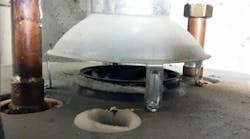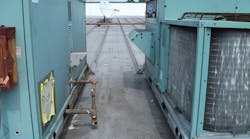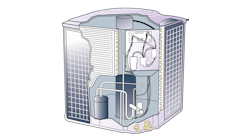BY RAY ISAAC
How can you ensure that your service technicians — the most public face of your company — are representing you well in the community? An old formula holds that happy technicians = happy customers. At Isaac Heating and Air Conditioning, we decided to survey our employees to find out what makes them happy. Why do people work for us? What do they like about our company? What could be improved? Why do they stay? Why do they leave?
We found our people were generally proud to work for our company, and were enthusiastic in referring friends and family to us. However, we also found that there was a need for improvement in certain areas, most notably communication, recognition, and work/personal life balance. Here's how we addressed these issues:
Communications. We formed "task teams" consisting of individuals from the various disciplines in the company, and asked the teams to come up with suggestions to improve the company. We found that this not only got our employees involved, it also made them think like the management and owners of the company. They offered suggestions that reflected that way of thinking.
We've instituted regular company meetings to examine the findings of these task teams, to let people know what has been acted on and what's still to be worked on.
We're also going to share the company's first page financials (sales and the cost of goods sold) with our employees, as well as our long-term growth goals. We want to explain that the reason for growth is to offer opportunities to our employees. The only way we're going to have the best and brightest people want to work for us is if we can show them the opportunities they'll have to advance. If your employees think that you want to stay the same size for the next 10 years, what does that tell them about where they'll be in the next 10 years?
Setting up task teams is a great way to get everybody going in the same direction, and it's something that any company can do. Just be aware that employees will want to see action. When you form a task team and say you want suggestions, you'd better be ready to respond to those suggestions, whether positive or negative. Obviously there will be some suggestions you can't implement, for any number of reasons. But you'll have to explain why or why not; you can't just ignore them.
Recognition. Good pay and solid benefits are great, but we wanted to create something beyond a paycheck.
We have a mission now to create "raving fans," which is from a book of the same name by Ken Blanchard. That's how we came up with our Raving Fans Bonus Bucks program.
Through this program, we printed up bonus bucks to give to employees who go above and beyond the call of duty. For example, I give $20 in bonus bucks to technicians who work more than 60 hours a week. We have catalogs through which our employees can select gifts to purchase with their bonus bucks. In these catalogs, a raving fans bonus buck goes about twice as far as a regular dollar. That's because a raving fan to us is worth twice what a regular customer or regular employee is worth.
This is a method of recognizing people that they really value. Having a system like this also creates many other opportunities for a business owner, because once you have a system in place to recognize high-performing people, it makes the recognition flow much easier throughout the company.
Balance. A final element that we found to be of concern to our technicians was a balance between work and personal life. Very rarely will you find someone who has a miserable work life and a happy home life. On the flip side, it's also very rare to find someone who has a miserable home life and a happy work life.
Obviously, we can't control what goes on at our employees' homes, but we can take steps to ensure that we're not creating a miserable home life by taking too much of our employees' time.
It's generally a young workforce at the technician level, and many of them have children. The last thing you want is for your employees to reach age 50 and say, "Gee, I missed every one of my kid's games because I was working."
Make sure your people get — and use — time off. During some very busy weeks you may ask people if they can work overtime, so balance has to be give and take. If people have a sufficient amount of time off, they'll also give you a sufficient amount of 70 hour weeks, too.
We've started using a sign-up sheet for overtime. This list shows how often people have volunteered to work overtime. We've found that we start to get some new volunteers when our techs (and everyone else) see where they stand on that chart. Getting some new people to volunteer for overtime takes the heat off those who always volunteer, and keeps them from burning out.
A balance between personal and business lives is critical. Support and encourage your employees' personal values and look for ways in which you can be flexible to meet your team members' personal needs. They'll appreciate it, and your reward will be an energized employee.
Make Employees Your Top Priority
As part of our recent self-examination, of which the survey was a part, we reranked our company's priorities. Our priorities are now safety first, employees second, clients third, and the company fourth. Simply put, if you place the safety and happiness of your technicians and other employees at the top of your company's priorities list, they'll look out for the best interests of your clients, and your company will prosper.
WHAT'S IMPORTANT TO A TECHNICIAN?By Keith Shaw I love this job! Why? First of all, because of the team atmosphere. I've been in customers' basements at 2 a.m., and if I have a question or a problem, I can call my supervisor and he'll walk me through it. My last company, a non-HVAC high-tech firm, liked to play up a "team" theme, but they can't hold a candle to the support I receive here. Also, I have everything at my disposal to do the job that I'm asked to do. There's nothing holding me back. I draw a great deal of enjoyment out of what I do, because I'm given the tools to do it. And not just literal tools, either. We make it a point to educate homeowners about their HVAC systems, and I've received a great deal of training and knowledge that I can share with customers. I really feel like I'm working in the customers' best interest. That's important when you're face-to-face with them. Those are the things that are most important to me. The pay and the benefits are just icing on the cake. Keith Shaw is a service representative at Isaac Heating & Air Conditioning. |
Ray Isaac is president of Isaac Heating & Air Conditioning, Inc, Rochester, NY. The company was Contracting Business' 2002 Residential Contractor of the Year. Ray can be reached at 585/546-1400. e-mail [email protected]








